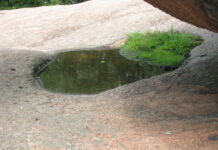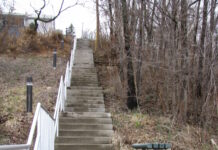Photo credit: DiasporaEngager (www.DiasporaEngager.com).
JNS.org – How far away is theory from practice? “In theory,” a new system should work. But it doesn’t always, does it? How many job applicants ticked all the boxes “theoretically,” but when it came to the bottom line they didn’t get the job done?
And how many famous people were better theorists than practitioners?
The great Greek philosopher Aristotle taught not only philosophy but virtue and ethics. The story is told that he was once discovered in a rather compromised moral position by his students. When they asked him how he, the great Aristotle, could engage in such an immoral practice, he had a clever answer: “Now I am not Aristotle.”
A similar tale is told of one of the great philosophers of the 20th century, Bertrand Russell. He, too, expounded on ethics and morality. And like Aristotle, he was also discovered in a similarly morally embarrassing situation.
When challenged, his rather brilliant answer was: “So what if I teach ethics? People teach mathematics, and they’re not triangles!”
This idea is relevant to this week’s Torah portion, Shelach, which contains the famous story of Moses sending a dozen spies on a reconnaissance mission to the Land of Israel. The mission goes sour. It was meant to be an intelligence-gathering exercise to see the best way of conquering Canaan. But it resulted in 10 of the 12 spies returning with an utterly negative report of a land teeming with giants and frightening warriors who, they claimed, would eat us alive. “We cannot ascend,” was their hopeless conclusion.
The people wept and had second thoughts about the Promised Land, and God said, indeed, you will not enter the land. In fact, for every day of the spies’ disastrous journey, the Israelites would languish a year in the wilderness. Hence, the 40-year delay in entering Israel. The day of their weeping was Tisha B’Av, which became a day of “weeping for generations” when both our Holy Temples were destroyed on that same day and many other calamities befell our people throughout history.
And the question resounds: How was it possible that these spies, all righteous noblemen, handpicked personally by Moses for the job, should so lose the plot? How did they go so wrong, so off-course from the Divine vision?
Naturally, there are many commentaries with a variety of explanations. To me personally, the most satisfying one I’ve found comes from a more mystical source.
Rabbi Schneur Zalman of Liadi, in his work Likkutei Torah, explains it thus: The error of the spies was less blatant than it seems. Their rationale was, in fact, a “holy” one. They actually meant well. The Israelites had been beneficiaries of the mighty miracles of God during their sojourn in the wilderness thus far. God had been providing for them supernaturally with manna from heaven every day, water that flowed from the “Well of Miriam,” Clouds of Glory that smoothed the roads and even dry cleaned their clothes. In the wilderness, the people were enjoying a taste of heaven itself. All their material needs were taken care of miraculously. With no material distractions, they were able to live a life of spiritual bliss, of refined existence and could devote themselves fully to Torah, prayer and spiritual experiences.
But the spies knew that as soon as the Israelites entered the Promised Land, the manna would cease to fall and they would have to till the land, plow, plant, knead, bake and make a living by the sweat of their brow. No more bread from heaven, but bread from the earth. Furthermore, they would have to battle the Canaanite nations for the land. What chance would they then have to devote themselves to idyllic, spiritual pursuits?
So, the spies preferred to remain in the wilderness rather than enter the land. Why be compelled to resort to natural and material means of surviving and living a wholly physical way of life when they could enjoy spiritual ecstasy and paradise undisturbed? Why get involved in the “rat race”?
But, of course, as “holy” and spiritual as their motivation may have been, the spies were dead wrong.
The journey in the wilderness was meant to be but a stepping stone to the ultimate purpose of the Exodus from Egypt: entering the Promised Land and making it a Holy Land. God has plenty of angels in heaven who exist in a pure, spiritual state. The whole purpose of creation was to have mortal human beings, with all their faults and frailties, to make the physical world a more spiritual place. To bring heaven down to earth.
While their argument was rooted in piety, for the spies to opt out of the very purpose of creation was to miss the whole point. What are we here for? To sit in the lotus position and meditate, or to get out there and change the world? Yes, the spies were “holy,” but theirs was an escapist holiness.
The Torah is not only a book of wisdom; it is also a book of action. Torah means instruction. It teaches us how to live our lives, meaningfully and productively in the pursuit of God’s intended desire to make our world a better, more Godly place. This we do not only by study and prayer, the “theoretical” part of Torah but by acts of goodness and kindness, by mitzvot performed physically in the reality of the material world. Theory alone leaves us looking like Aristotle with his pants down.
Yes, it is a cliché but a well-worn truth: Torah is a “way of life.”
Source of original article: Yossy Goldman / JNS.org / Opinion – Algemeiner.com (www.algemeiner.com).
The content of this article does not necessarily reflect the views or opinion of Global Diaspora News (www.GlobalDiasporaNews.com).
To submit your press release: (https://www.GlobalDiasporaNews.com/pr).
To advertise on Global Diaspora News: (www.GlobalDiasporaNews.com/ads).
Sign up to Global Diaspora News newsletter (https://www.GlobalDiasporaNews.com/newsletter/) to start receiving updates and opportunities directly in your email inbox for free.
































